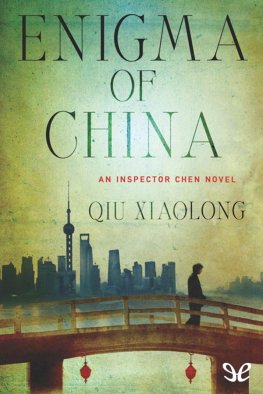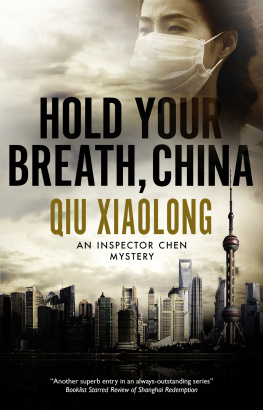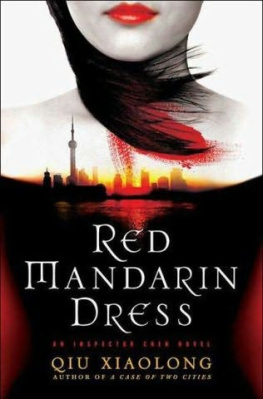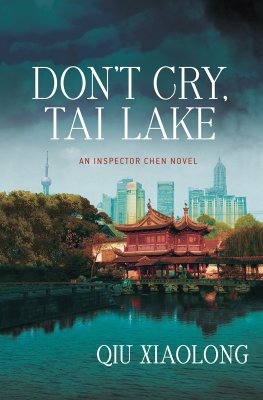Qiu Xiaolong - Enigma of China
Here you can read online Qiu Xiaolong - Enigma of China full text of the book (entire story) in english for free. Download pdf and epub, get meaning, cover and reviews about this ebook. year: 2013, publisher: ePubLibre, genre: Detective and thriller. Description of the work, (preface) as well as reviews are available. Best literature library LitArk.com created for fans of good reading and offers a wide selection of genres:
Romance novel
Science fiction
Adventure
Detective
Science
History
Home and family
Prose
Art
Politics
Computer
Non-fiction
Religion
Business
Children
Humor
Choose a favorite category and find really read worthwhile books. Enjoy immersion in the world of imagination, feel the emotions of the characters or learn something new for yourself, make an fascinating discovery.
- Book:Enigma of China
- Author:
- Publisher:ePubLibre
- Genre:
- Year:2013
- Rating:4 / 5
- Favourites:Add to favourites
- Your mark:
- 80
- 1
- 2
- 3
- 4
- 5
Enigma of China: summary, description and annotation
We offer to read an annotation, description, summary or preface (depends on what the author of the book "Enigma of China" wrote himself). If you haven't found the necessary information about the book — write in the comments, we will try to find it.
Enigma of China — read online for free the complete book (whole text) full work
Below is the text of the book, divided by pages. System saving the place of the last page read, allows you to conveniently read the book "Enigma of China" online for free, without having to search again every time where you left off. Put a bookmark, and you can go to the page where you finished reading at any time.
Font size:
Interval:
Bookmark:
Qiu Xiaolong
Enigma of China
ONE
Chief Inspector Chen Cao, of the Shanghai Police Bureau, was attending a lecture at the Shanghai Writers Association, sitting in the audience, frowning yet nodding, as if in rhythmic response to the speech.
The enigma of China. Whats that? Well, theres a popular political catchphrase-socialism with Chinese characteristics-which is indeed an umbrella term for many enigmatic things. Things that are called socialist or communist in our Partys newspapers but are in practice actually capitalistic, primitive or crony capitalistic, and utterly materialistic. And feudalistic, in that the children of high cadres-or princes-are themselves high cadres: the red trustworthy, or the successors in our one-party system.
In spite of the Party propaganda machines chunking away at full throttle, Chinese society is morally, ideologically, and ethically bankrupt, yet still going, going like the rabbit in an American television commercial.
After tapping his pants pocket, looking for a pack of cigarettes, Chen stopped and thought better of it.
It was one of those controversial yet permissible lectures. The speaker was a well-known scholar named Yao Ji, a research law professor at Shanghai Academy of Social Science. Not exactly a dissident, Yao was nonetheless considered a potential troublemaker because of his open criticisms of the problems in society. He had published a number of contentious articles and posted even more unpublishable articles on several blogs online. A gaunt, angular man, he spoke with his hands on the podium, his body leaning slightly forward, and his prominently balding head reflecting the light pouring in through the stained-glass window. He looked like a hallowed figure, as in a time-yellowed painting.
Chen happened to know a thing or two about Yao due to an internal blacklist memo circulated in the police department. But it wasnt his business, Chen told himself. He adjusted the amber-colored glasses along the ridge of his nose and pulled down the French beret just a little. He hoped he looked like anything but a cop. Here and now, it wasnt a good idea to be recognized, even though several members of the association knew him fairly well. For the moment, Chen found himself bugged by the word enigma. It somehow reminded him, distantly, of a painting hed seen, though he couldnt recall the details. Professor Yao was producing a flurry of concrete examples.
Indeed, what are the characteristics of China? There are so many different interpretations and definitions. Here are some examples that speak for themselves. A Beijing University professor tells his students: Dont come to me if you dont make four hundred million by the time youre forty. The professor specializes in real estate development, advocating high-priced housing investments in return for the referral fees he receives from developers. For him, and for his students, the only value in the world of red dust is what shines in cash.
In a reality show, where the participants were discussing how one makes a marriage choice, a young girl stated her manifesto: she would rather weep in a BMW than laugh on a bike. The message of that is unmistakable. A rich husband who can provide her with material luxuries-even if in a loveless marriage-is what she wants. In a recent drunk driving case, the accused actually shouted at the cops, My father is Zhang Gang. Zhang Gang is a high-ranking Party official, in charge of the local police bureau. Sure enough, the cops were hesitant to arrest him, but a passerby recorded the scene with his cell phone and placed the clip on the Internet. Immediately My father is Zhang Gang becomes an Internet catchphrase.
These were all examples of what was really happening in China, Chen thought. But what did they mean?
For the government, stability was the main priority. It was declared that the economic and social progress from Chinas reforms had been achieved because of that stability. Yet the Party authorities were finding it increasingly hard to maintain that stability, despite their efforts to cover up any unstable factors.
Professor Yao was coming to his conclusion.
In a time when the governments legitimacy is disappearing and the Partys ideology disintegrating, I am, as a legal scholar, still trying to hold that last line of defense-a real, independent legal system-hoping against hope for the future of our society.
Chen, his brows knitted more deeply, joined in the applause. As a cop, he found it far from pleasant to listen to such a lecture.
Still, he would rather be sitting here than in a routine political meeting with Party Secretary Li Guohua and other officials at the bureau.
Li, the Party boss of the police bureau, was reaching retirement age, and Chen was unanimously seen as his successor. But for one reason or another, Li had been recently reappointed for another two years. As a sort of compensation, Chen was made the first deputy Party secretary of the bureau and a member of the Shanghai Communist Party Committee.
To those on the outside, it looked like a promotion for Chen, but not in the Party power structure. Some leading comrades in the city government, not considering Chen one of them, didnt want him to be the head of the bureau. They were uncomfortable with the prospect of Chens taking on such a key position.
So the meeting at the Writers Association gave him an excuse to not attend the routine Tuesday political studies meeting at the bureau. It would only drive him nuts to sit there while Li mouthed all the political phrases from the Party newspapers.
The subsiding applause pulled him back from his wandering thoughts. Now came the question and answer period. After that, it would be time for the meeting of executive members that they had scheduled weeks earlier.
Chen got up and walked out of the conference hall and out into the buildings secluded garden. The association was located in a mansion built by a wealthy businessman in the thirties, then seized by the Party after 1949. For many years, the mansion had been used as the office complex for the Writers Association.
He walked through the garden, coming to a stop by a tiny pond. He gazed at the white marble angel posing in the middle of the water. It was nothing short of a miracle, he mused, that the statue had survived the Cultural Revolution.
It was all because of Old Bao, the doorkeeper for the association, who, as an ordinary worker, was politically glorious and trusted by the Red Guards back then. One dark night during the Cultural Revolution, he moved the statue home in stealth on a tricycle and hid it under his bed. When the Red Guards came to smash anything bourgeois and decadent, the nude statue, which was on the top of their list, was inexplicably gone. They questioned everybody except Old Bao, who was wearing a red armband and shouting revolutionary slogans more loudly than anyone. The disappearance of the statue remained a mystery for more than a decade, until after the Cultural Revolution ended. Then Old Bao moved the statue back to its original site in the garden. When people asked him why he had taken such a risk, he simply said that it was his responsibility as doorkeeper to keep things in the mansion from being damaged or destroyed.
Looking up from the pond, Chen saw a man waving at him from the visitor registration desk near the buildings entrance. It was none other than Young Bao, the only son of Old Bao. When the old man was about to retire in the midnineties, his son was without a job. Thanks to Chens suggestion that the son succeed the father, Young Bao came to sit at the same desk, with the same register, with a cup of tea-possibly the same cup-just as Old Bao had for years.
Chen was waving back at Young Bao when he heard footsteps. He turned around to see An, the newly elected head of the association, approaching.
Font size:
Interval:
Bookmark:
Similar books «Enigma of China»
Look at similar books to Enigma of China. We have selected literature similar in name and meaning in the hope of providing readers with more options to find new, interesting, not yet read works.
Discussion, reviews of the book Enigma of China and just readers' own opinions. Leave your comments, write what you think about the work, its meaning or the main characters. Specify what exactly you liked and what you didn't like, and why you think so.







